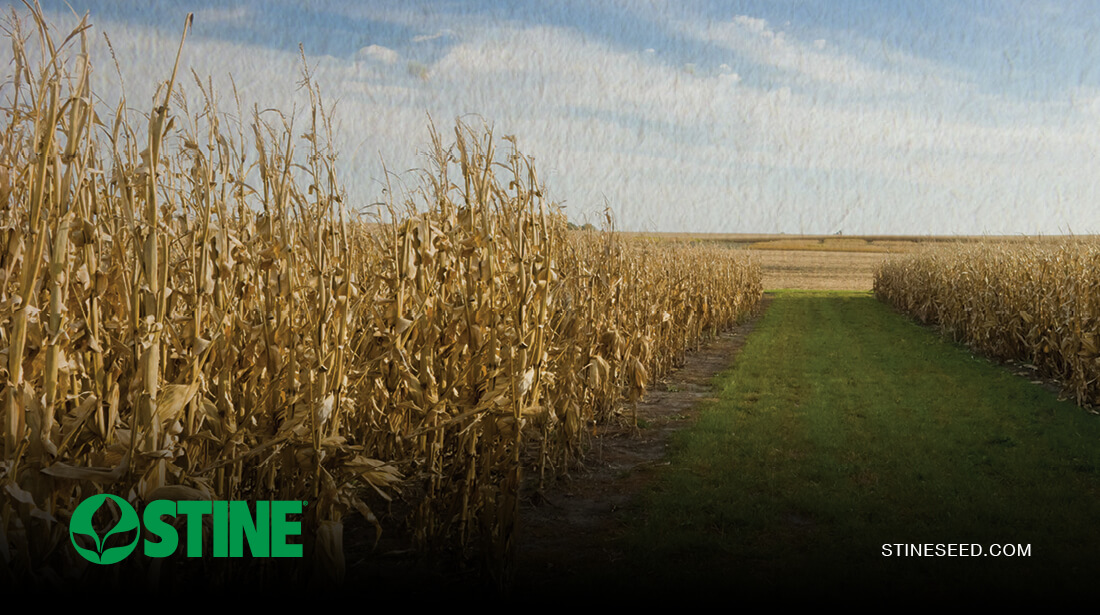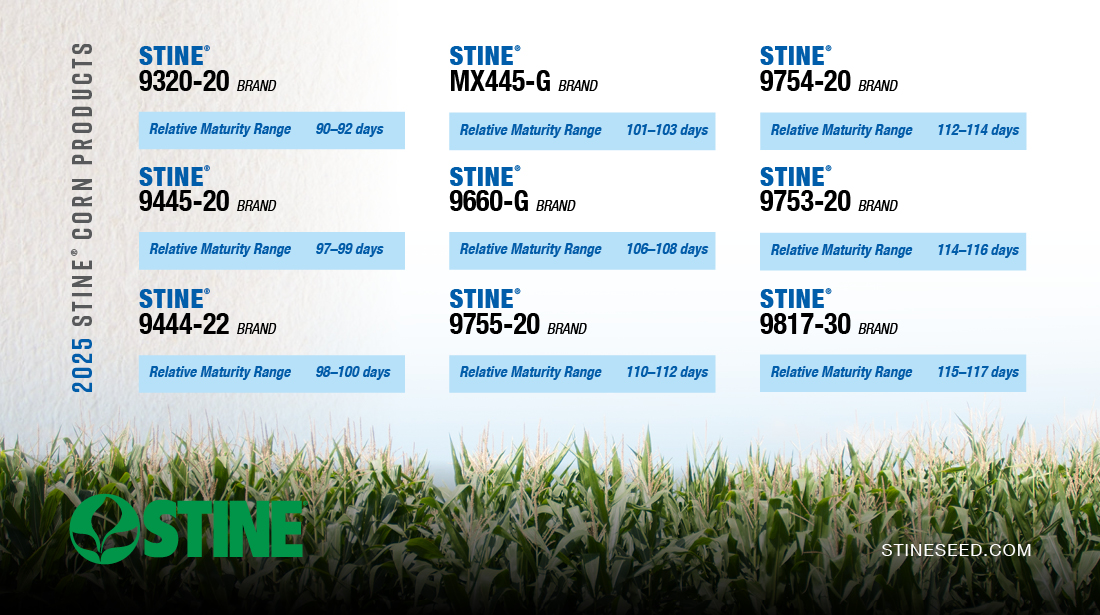Stine® Seed Company’s agronomy team not only has a wealth of experience in agronomic research but also millions of data points to prove the effectiveness of Stine products in certain environments. In fact, one of their primary duties is to manage our Product Development Plot (PDP) program, which helps us better evaluate our hybrids and varieties before commercialization. They test our tried-and-true products that are part of our lineup and our experimental products that are close to commercialization against industry competitor material. This helps them not only determine how our products fair against the competition but also how they perform in different growing environments and against different stressors.

“Our PDP program is complex for a reason. We need confidence and clarity for our new and upcoming products. Our PDP plots throughout the United States give us the data and insights that allow us to more effectively place products in growers’ fields.”
Tom Larson, Stine® Seed Company’s director of agronomy
Over the past month, Stine agronomists have been busy harvesting PDPs, with results showing which Stine products have displayed season-long performance and achieved top-end yields. This two-part article series will cover a sampling of the top product picks in the regions they cover that growers should consider for 2025.

Top Product Picks
Daniel Greblunas, field agronomist for Nebraska and Kansas
Corn
- Stine 9754-20: This line has been one of the most consistent for me this year. In an irrigated plot in Elm Creek, Nebraska, it went 286 bu/acre. It has had great standability, strong root systems and high-end yield potential.
- Stine 9755-20: This is another strong product. In the same Elm Creek plot, it yielded 290 bu/acre. 9755-20 definitely has high-end yield potential in the right environment and has shown great flex that can work in a variety of different soils and populations. For a 111-day line, we have seen it work very well farther south where 111-day hybrids may not be the norm.
- Stine 9817-30: 9817-30 has had a very good year compared to last year. It displayed strong standability, an impressive root system and good performance against disease. We saw much less ear feeding with it, which was more prevalent in my area compared to previous years. In the same Elm Creek plot, it yielded 281 bu/acre.
Soybeans
- Stine 29EF02: This line had a very impressive year. It was toward the top in multiple bean plots. Also, while doing visits with multiple farmers during harvest, it was trending toward the top for a lot of my area. In Mead, Nebraska, 29EF02 yielded 86.5 bu/acre, winning the plot.
- Stine 28EH32: I love the plant architecture and standability of this line. It shades the row well and is good on sudden death syndrome. In the Mead, Nebraska, plot, it also was toward the top, yielding 85 bu/acre.
- Stine 30EH23 and 30EH32: I am excited about both beans. In the plots, they are always toward the top, but one isn’t consistently out-yielding the other for my area. Both are great options with high-end yield potential. In the Mead plot, 30EH23 went 85.5 bu/acre and 30EH32 went 86.4 bu/acre.
Jacob Foote, field agronomist for Indiana, Michigan, Ohio and Pennsylvania
- Stine 9444-22: This line had impressive yields this year throughout our Michigan PDPs, averaging 230 bu/acre with nearly a 60-pound test weight. It has been a standout since emergence; 9444-22 was fast out of the ground and held up well against disease pressures and the heavy winds throughout the year. This line performs well on higher-productivity soil but also on sandy soils when given a little more space to grow with a slightly reduced population.
- Stine 9445-20: This line has had great test weights in our PDP trials, averaging just over 59 pounds. It handled the wet planting conditions well and has looked impressive all year, averaging 205 bu/acre across our plots. It is a little bit slower out of the ground but hits the gas during grain fill and doesn’t look back. 9445-20 also handles a wide range of soil types and has a lot of yield potential.
- Stine MX445-G: This is a shining example of how Stine has revolutionized the short corn market. It can handle narrow rows and higher populations and can still hit high-yield goals. MX445-G is extremely fast out of the ground and sets strong roots early, giving it impressive standability throughout the year. In our Frankenmuth, Michigan, plot, MX445-G hit 270 bu/acre.
Mid-hybrids:
- Stine 9755-20: This is a line that should be on everyone’s radar. It is one of our new hybrids and has great yield potential. Across all the PDPs harvested so far this year, it has consistently had high yields on the varying soil types, which is incredible given the variations in soil types and climates within our respective sales territories. It can handle the wet soils and has seemed to pollinate earlier than other hybrids in its maturity set. It has impressive brace roots and great standability and can handle the heat well compared to others.
- Stine 9660-G: This is another line that is on the shorter side and is quick out of the ground. Standability has been remarkable all year, and 9660-G has shown great disease resistance against tar spot and northern corn leaf blight. It produces a large ear and has even shown to produce double ears. This line performs better when planted early with a higher population on your higher-fertility soils.
Kayla Noble, technical agronomist for Iowa, Illinois, Minnesota and Wisconsin
Here are my top picks for 2025:
Soybeans
- Stine 13EH62: This is a showy, branchier, more defensive bean with top-end yield. It expresses good early-season vigor even in saturated/stressed environments and tolerates iron deficiency chlorosis well in western Minnesota. It is currently averaging 106.8% of the test across this year’s harvested PDPs.
- Stine 24EH32: A taller bushy bean that thrives in high-population environments, it performs well against SDS and white mold. This line produces bigger leaves with a longer petiole that can result in some later-season lodging but stands back up once it drops its leaves. It is currently averaging 104.2% of the test across this year’s harvested PDPs.
- Stine 30EH32: This medium-tall semi-branch soybean has more racehorse tendencies across higher-productivity ground but also does well in marginal environments. It is quick out of the ground with excellent vigor and currently averaging 107.3% of the test across this year’s harvested PDPs.
Corn
- Stine 9320-20: We saw strong, consistent emergence across most locations with this line this year. It features great in-season plant health, stalk quality and root structure. It has good-looking ears at harvest, with an average test weight of 58.5 pounds. 9320-20 is a possible silage option and currently averaging 105.5% of the test across this year’s harvested PDPs.
- Stine 9445-20: This line features great season-long plant health and disease tolerance. I’m seeing top-end yields on more medium-textured soils, but it performs well across environments with little to no tip back. I’d recommend pushing populations to 105%. Average test weight is around 59 pounds, and it’s currently averaging 100% of the test across this year’s harvested PDPs.
- Stine 9754-20: This is a taller plant with good emergence, stalk quality, plant health and standability. It does well against most foliar diseases and responds well to a fungicide, especially if tar spot is a concern. 9754-20 has an average test weight of 59 pounds and is currently averaging 100.3% of the test across this year’s harvested PDPs.
Mark Johnson, technical agronomist for the south-central U.S.
With all my corn PDPs harvested now across Missouri, Arkansas, Kansas and Louisiana, there have been some of our new releases this year that have really come to the front of the pack. I believe Stine 9753-20, 9754-20 and 9755-20 have a place in fields across the region that I cover. All three are VTDoubleProä lines. Stine 9753-20 (115-day) can move across a big footprint. I have seen it go from 233 bu/acre to 200 bu/acre in other parts where the growing conditions were not as good. 9753-20 really excels with higher-management practices. Stine 9754-20 (113-day) is just a little different of a line. With the southern movement and deeper southwest areas of my territories, I would use a little caution. It still performs well, but I believe it is a better fit for the northern parts of Missouri. Stine 9755-20 (111-day) has been great to look at through the growing season. For a 111-day corn line, it can move south if there is someone looking to place a hybrid to harvest first. It has very good health and the means to bring some bushels in. This line won my Louisiana plot at 229 bu/acre and is in the top three consistently in my PDPs.
Soybean harvest is just winding down for the most part. There are a few lines that keep coming to the front: Stine 38EH02, 40EH92 and 43EH32. All these have great standability and good defense package. Stine 38EH20 won my west-central Missouri PDP, topping the rest at 83.2 bu/acre. Following very close behind were Stine 43EH32 and 40EH92. This can be said for my other plots that I had these in: If they were not winning, these would be in the top one-third in yield.
Ian Matzenbacher, field agronomist in Southern Illinois
Corn
- Stine 9755-20: This is a top-yielding early-season corn line in the late maturities. It’s done very well in the plots this year, typically in the top five to 10. It’s a good early option for productive acres to get top-end yield.
- Stine 9754-20: This is a good mid-maturity option for tougher acres, especially with the DroughtGard® trait. It’s been super consistent with high yields, especially here in southern Illinois, where it seems we're always in a drought. 9754-20 is a solid tough-ground corn with top-yield potential.
- Stine 9753-20: This is the racehorse of these three lines. It has the best potential for top-end yield, but it has to be treated like a racehorse hybrid to get the best yields out of it, which include fungicide and side dressing. This should go on the most productive acres, and it won't disappoint.
Soybeans
- Stine 29EF02: This has been a consistent line for the past three years in the early maturity range for my area. Every year I talk to growers, they all speak very highly of it and how high it yields even compared to later numbers. It’s meant for the best acres, but it can be put on tough ground, and it will do very well.
- Stine 30EH23 and 30EH32: Both lines are very similar from what I've seen; it just matters what disease package you want for your acres. They have consistently shown they can yield very high in multiple plots and tend to beat out 29EF02. They have been in the top five of multiple plots across the Midwest.
- Stine 34EH29: This is a top-end yielder and has proven itself across the state of Illinois. It’s fast out of the ground and tends to look the healthiest. It’s a very tall bean compared to others, and it is ideal for the tougher acres of a farm. 34EH29 can be a top-end yielder on the best acres, but it sometimes has to be slowed down because it gets so tall.
- Stine 35EG92: This is our go-anywhere bean. You can put it on your tough ground and your best dirt, and you wouldn't be disappointed. It has consistently shown to be a top yielder over the past two years and has been a staple in our lineup since being introduced.
- Stine 37EG23: Another good option to put anywhere on your farm, it has consistently been a good bean across any acres. It tends to be in the top 10 of plots and can handle plenty of stress.
- Stine 39EH20: This line takes off out of the ground and has a semi-bushy structure. It will do well on the tougher acres in 15- and 20-inch rows. It has top-end yield on the better acres and has proven itself across Illinois.
For more information on our 2025 lineup, reach out to your local Stine sales representative or one of our agronomists. You can also view the 2025 Stine Seed Catalog online.
Related Articles
-

Stine® to market Enlist E3® Expance™ soybean trait technology
February 2026 in Agronomy
-

Leveraging drone technology for improved research
February 2026 in Agronomy
-

MX Series Corn by Stine®: Proven performance for 2026
January 2026 in Agronomy
-

Start strong with Stine®: Maximizing your 2026 potential
January 2026 in Agronomy



